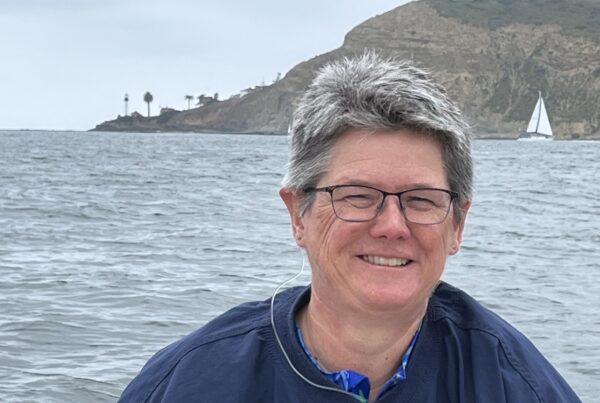This sermon was prepared and written by Rev. Dr. Denise Kingdom Grier, lead pastor of Maple Avenue Ministries in Holland, Michigan. She also serves as RCA Global Mission’s project leader in South Africa, partnering to help orphaned and vulnerable children find loving families. This sermon is a resource for the RCA’s We Are Speaking movement, a call to the church to no longer remain silent about harassment, abuse, and sexual violence.
Scripture: Psalm 31
Naturally, the first voice to pray is Eve. She prays out of torment and in deep pain—the pain of a mother who has lost her son to senseless violence, an even greater pain because this loss was at the hand of her other son. On behalf of all mothers who know this pain—whose pain has been overshadowed or even ignored because of violence—today, on Mother’s Day, Eve prays over the blood that cries from the ground.
She prays with grief for a son who is exiled. She cries for mothers with empty arms because of violence: “In you, O LORD, I seek refuge; do not let me ever be put to shame; in your righteousness deliver me. Incline your ear to me; rescue me speedily. Be a rock of refuge for me, a strong fortress to save me. You are indeed my rock and my fortress; for your name’s sake lead me and guide me, take me out of the net that is hidden for me, for you are my refuge” (Psalm 31:1-4).
This is a mother’s prayer meeting. Psalm 31 gives the language for mothers to pray all kinds of prayers together, for their children, with their children, and with the entire church. We can all learn to pray at a mothers’ prayer meeting.
“Into your hand I commit my spirit; you have redeemed me, O LORD, faithful God” (Psalm 31:5).
So prays the widow from Zarephath (1 Kings 17), whose oil lasted one extra day because the prophet Elijah came by, demanding she use her last flour and oil to make him a little cake. Those were the ingredients to make a last supper before she and her son would starve to death. She prays on behalf of all mothers who choose to operate out of abundance in times of scarcity, mothers who share butter with neighbors, though it be the last stick, and mothers who nurse other babies with the milk for their own children so those babies don’t starve. These mothers are content to find daily bread, day after day.
If you use your imagination, you would see Syrian mothers with looks of disbelief and desperation, for their children are being killed. Yoḫáved kneels to pray.
Yes, Moses’s mother is here, too. She put her son in a basket in the river (Exodus 2). What kind of desperation would drive a mother to put her child in a basket into Lake Macatawa today? But what alternative did Moses’s mother have? She had to take a chance; she had to act in faith like the countless mothers who send their children across water, across wilderness, and across desert. For them and for herself, she prays: “You hate those who pay regard to worthless idols, but I trust in the LORD. I will exult and rejoice in your steadfast love, because you have seen my affliction; you have taken heed of my adversities, and have not delivered me into the hand of the enemy; you have set my feet in a broad place” (Psalm 31:6-8).
Then, silence, the kind of silence that is familiar at a prayer meeting. Words are obstacles, and silent ones are only supplication. Silence, as though everyone is waiting for someone, something.
“Be gracious to me, O LORD, for I am in distress; my eye wastes away from grief, my soul and body also” (Psalm 31:9).
It is Bathsheba (2 Samuel 11-12). She is praying for the mothers who had to carry small caskets to the cemetery. For those like her, who only got to hold their child for seven days; other mothers, fewer days. She prays for mothers who wonder, as she did: If only, maybe I should have, maybe I should not have…
Her courage prompts Tamar (2 Samuel 13) to stand to her feet, sobbing uncontrollably, and shaking to her core. Her brother has raped her. No one has seen her nor heard from her since that day. She has taken refuge—some say a prison of shame—in the household of her brother Absalom. Is she even a mother? She doesn’t say; she just cries out in a loud trembling voice: “For my life is spent with sorrow, and my years with sighing; my strength fails because of my misery, and my bones waste away” (Psalm 31:10). Tamar prays for every victim of rape, incest, and abuse; for those demanded into silence by society.
This is a mothers’ prayer meeting. All of the mothers are here, even Hagar, for whom the blanket of shame is surely looming. Did you hear what she did? Did you hear what happened in the wilderness after she was literally carried out of the household of Abram and Sarai. She was left for dead in the wilderness. When the little water she had was gone, her son, Ishmael, began to cry from hunger. His little eyes began to bulge, and his lips parched over. She picked him up and sat him at a distance so he could die alone. Alone. How neglectful, we think. Wouldn’t any good mother want to let her child die in her arms? I can hear the child protective services worker in the adjudication hearing, asking for child removal, as neglect charges label her—and others like her—unfit to be parents.
Never mind the abuse she has endured. Never mind the circumstances and the people in power who used her and set her aside. Never mind that she doesn’t know how to hold her child while also holding her grief, anger, and despair. She weeps and prays: “I am the scorn of all my adversaries, a horror to my neighbors, an object of dread to my acquaintances; those who see me in the street flee from me. I have passed out of mind like one who is dead; I have become like a broken vessel. For I hear the whispering of many—terror all around!—as they scheme together against me, as they plot to take my life” (Psalm 31:11-13).
Then, the childless woman speaks. She is desperate for a child, yet for one reason or another, is unable to bring forth a child. Hannah is her name (1 Samuel). She will, one day, give birth to a child, Samuel the prophet. She will dedicate him to the Lord, but today, she doesn’t know that.
Hannah and Elizabeth, the wife of Zechariah, lock eyes as both their mouths open to pray at the same time. Elizabeth, too, will one day give birth to a child, John the baptizer. But she doesn’t know that yet, either.
Deborah, strong and accomplished, is here too. A five-star general, a pastor of Israel, and a Supreme Court justice, she joins them, childless because of her occupation or occupied because she is childless. She prays with the other two: “But I trust in you, O LORD; I say, ‘You are my God.’ My times are in your hand; deliver me from the hand of my enemies and persecutors. Let your face shine upon your servant; save me in your steadfast love” (Psalm 31:14-16).
And, that’s when it happens. They must have heard the mothers were gathering and praying. In walks a multitude of children. Esther is among them, for she was orphaned when her parents died. I recognize another little girl, whose name I don’t know, but I recognize her from Acts 16—“She followed Paul and the rest of us, shouting, ‘These men are servants of the Most High God, who are telling you the way to be saved.’ She kept this up for many days. Finally Paul became so annoyed that he turned around and said to the spirit, ‘In the name of Jesus Christ I command you to come out of her!’ At that moment the spirit left her. When her owners realized that their hope of making money was gone, they seized Paul and Silas and dragged them into the marketplace to face the authorities” (Acts 16:17-19, NIV).
These motherless children barged into the mothers’ prayer meeting, and they pray in unison, as with one voice to God and to the mothers, too: “Do not let me be put to shame, O LORD, for I call on you; let the wicked be put to shame; let them go dumbfounded to Sheol” (Psalm 31:17).
A nameless, voiceless, mother continues. She is Jephthah’s wife (Judges 11). Her husband trifled with God, making an empty promise: if you give our army victory, I will sacrifice the first thing that comes out of my house. He was expecting a goat or a lamb, I’m sure, but that morning, when victory was declared, out ran his only daughter. Being a righteous man, he had to do what he’d promised, and he did. The foolish man made an unnecessary promise and sacrificed his daughter, his wife’s little girl, because of it. Now, it’s as if Jephthah’s wife is trying to calm the children and the room. She intercedes for all women who are victims and survivors of domestic violence: “Let the lying lips be stilled that speak insolently against the righteous with pride and contempt” (Psalm 31:18).
Jephthah’s wife looks hopefully toward Mary, and the eyes in the room follow, for they all know that Mary knows something. Mother Mary knows the burden of being chosen to do an impossible task, one only possible through God. She knows the fear of exile and infanticide. She knows the bewilderment of a mother whose child has wandered off, for her son was once lost for three days.
She knows what it is to have a peculiar child, different from the others, strange, odd, and labeled. Hers is a child who would go to the wilderness and not eat for days; who would walk the countryside, sleeping and eating where he could; who would reject the family business.
She knows what it is to have her child ridiculed. As mother to the Son of God, she still knows the pain of any other mother. It must have pained her to hear the lies they would speak about him—he has a demon, he speaks of his own authority, he defies Caesar. It must have angered her to have his motives and intentions misrepresented.
Mary knows there is something—someone—for every mother in this room; for every woman not able to be a mother; for every woman denied entry because she would, for whatever reason, choose not to become a mother.
Mary knows that someone is her son Jesus, who loved the world so much that he gave it all, even his life. In front of the world, he hung on a cross, naked before his mother, beaten, bruised, killed, and buried.
Mother Mary knows but one response to it all—the torment, the violence, the desperation, the abuse, the grief, the anger, the pain. She invites all the women and the children in prayer to her son Jesus, saying: “O how abundant is your goodness that you have laid up for those who fear you, and accomplished for those who take refuge in you, in the sight of everyone! In the shelter of your presence you hide them from human plots; you hold them safe under your shelter from contentious tongues.
“Blessed be the LORD, for he has wondrously shown his steadfast love to me when I was beset as a city under siege. I had said in my alarm, ‘I am driven far from your sight.’ But you heard my supplications when I cried out to you for help” (Psalm 31:19-22).
The prayer meeting erupts with praise from the children and the childless, from the abused and the survivor, from the first and the last.
The One who is Sophia in wisdom literature, who is the feminine Ruach at the dawn of creation, the One who in lives and reigns with the Father and the Son as Spirit admonishes all who were in the room at this mothers’ prayer meeting and all who are gathered here today: “Love the LORD, all you his saints. The LORD preserves the faithful, but abundantly repays the one who acts haughtily. Be strong, and let your heart take courage, all you who wait for the Lord” (Psalm 31:23-24).

Rev. Dr. Denise Kingdom
The Rev. Dr. Denise Kingdom lives in Holland, Michigan, and is the mobilization pastor at Mars Hill Bible Church in Grandville and Grand Rapids, Michigan. She serves the Reformed Church in America as RCA Global Mission’s liaison to Setshabelo Family and Child Services in South Africa, where 30,000 orphans are finding loving homes within their community. She has been part of the RCA Women’s Transformation and Leadership guiding coalition since its inception and has helped give birth to Equity-Based Hospitality, Dismantling Racism, and the She is Called: Women of the Bible studies. Her work can be found at www.1cor13project.com.



